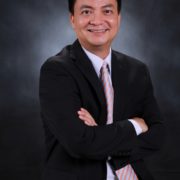“About a week after arriving in the Philippines, I happened to wake up one day at 7 o’clock in the morning. My father got angry and he scolded me. As a newcomer in the country, he said, I had to work harder than the people here. “You cannot wake up at 7 o’clock. You must wake up at 5 o’clock.” I was 16 then and that incident opened my eyes to the importance of diligence and hard work, and I have taken my father’s advice to heart since then.
Dr. Andrew L. Tan
With a net worth of US$5.1 Billion and ranked next to fellow industrialists, Henry Sy, Lucio Tan, Forbes Asia Magazine described the first generation Dr. Tan as a “Property Plutocrat with a large stake in Megaworld, a builder of apartment complexes doubling as small cities. He is big into Brandy, too. His Emperador Distillers went public last year and is now worth P172.50 Billion.
Last May, Emperador acquired the 5th biggest scotch maker in the world, Whyte and MacKay for US $720 Million outbidding global brands like LVMH. His fortune extends to 408 McDonald’s restaurants in the Philippines and the gaming leader Resorts World Manila.”
Also last year, Tan’s holding company, Alliance Global Group became the country’s 10th most valuable conglomerate with a market capitalization of P277.28 Billion, just a billion shy of power retailer, Meralco and the youngest entrant to the prestigious list.
Clearly, Andrew has built, through “hardwork and brand building,” an impressive portfolio through the Alliance Global Group that include Megaworld Corp., Travellers International Hotel Group Inc., Emperador Distillers Inc., Golden Arches Development Corp., Empire East Land Holdings Inc. and Suntrust Properties Inc.
But these did not come easy for Tan, who started working for others as a marketing executive. In a one on one interview, he emphatically remarked, “Business was tough when I started my first company. When you don’t have much capital, it is paramount that you exercise your nose a lot, much like a dog that never ceases to sniff out for food. You cannot afford to fail and lose vital resources. That is how you develop an instinct for success,” Tan relates.
He revealed that two weeks after they launched the first Megaworld project in 1989, the bloodiest coup threatened the Cory Aquino administration.
“Considering that Megaworld then was a start-up, the decision to pursue this project was one of the toughest I made,” Tan notes.
“The Asian financial crisis in 1997 also tested me and Megaworld a lot. The crisis especially threatened the real estate industry. Banks were very averse to lending. We were able to overcome this and came out stronger by being innovative. Megaworld launched Eastwood City, our first integrated township project with the live-work-play mantra, in the late 1990s,” he explains.
Today, Eastwood City is what Tan now considered as the “epitome of a successful development: Eastwood City Cyberpark has been named as the No. 1 IT Park and counts more than 40,000 employees, while our condo residents enjoy living here, and shoppers love visiting our new Eastwood Mall.” The success of Eastwood City has spawned 15 other City Centers concepts all over the country.
So how did Tan climbed to the top? Hard Work and Determination!
The son of poor immigrants from Fujian province, Andrew was born in China. His family migrated to Hong Kong when he was four years old. As a child, he and his family used to share a tenement apartment with four other families, with only one bathroom and one concrete table for all the families’ cooking stoves. Tan recalls the apartment owner even leased out the corridor to another family.
At 16, he came to the Philippines to join his father who was then working in a transistor radio factory. Tan recalls the difficult period, “I lived with my parents in a cramped 20 square meter apartment in Sta. Cruz, Manila. I struggled throughout my college days because I had no money. To save on jeepney fare, I walked every day from my apartment to the UE campus on C.M. Recto. “
For lunch, Tan often ate “bananacue” (fried bananas) that he bought from vendors along Gastambide Street. During his first two years as a student, he supported himself by selling watches and tutoring grade school students in math on a part-time basis. It was hard juggling a part-time job and going to college, but Tan never complained. He learned that whether working or studying, doing it as best as he could brought him a sense of satisfaction and fulfillment. It also helped him become a better person.
Most of Tan’s classmates were better off than him since their families owned small businesses such as a grocery or hardware store. That started him to dream of doing his own business to give his family a better life.
He quipped, “I would tell myself that if I had P200, 000 ($4,500)—a lot of money back then—I would use it to open a grocery store!”
The young Andrew took up Bachelor of Science in Business Administration and eventually graduated magna cum laude in 1974. Such a feat for a young dreamer armed only with the values of hard work, tenacity and a burning desire to help his family have a better life!
Indeed, Dr. Andrew L. Tan has already gone far from his simple dream of owning a small grocery store to becoming one of Asia’s wealthiest businessmen.
***
(Prof. Soriano worked with Dr. Tan for close to 8 years occupying senior management positions as Chair, CEO and Director of various business units under the Alliance Global Group. He is now an ASEAN Family Business Advisor and Chair of the Marketing Cluster of the ATENEO Graduate School of Business. Prof Soriano is a National Agora Awardee and book author of Kite Runner, a book on Family Business Governance and Succession. For comments, you may email the writer at [email protected])





